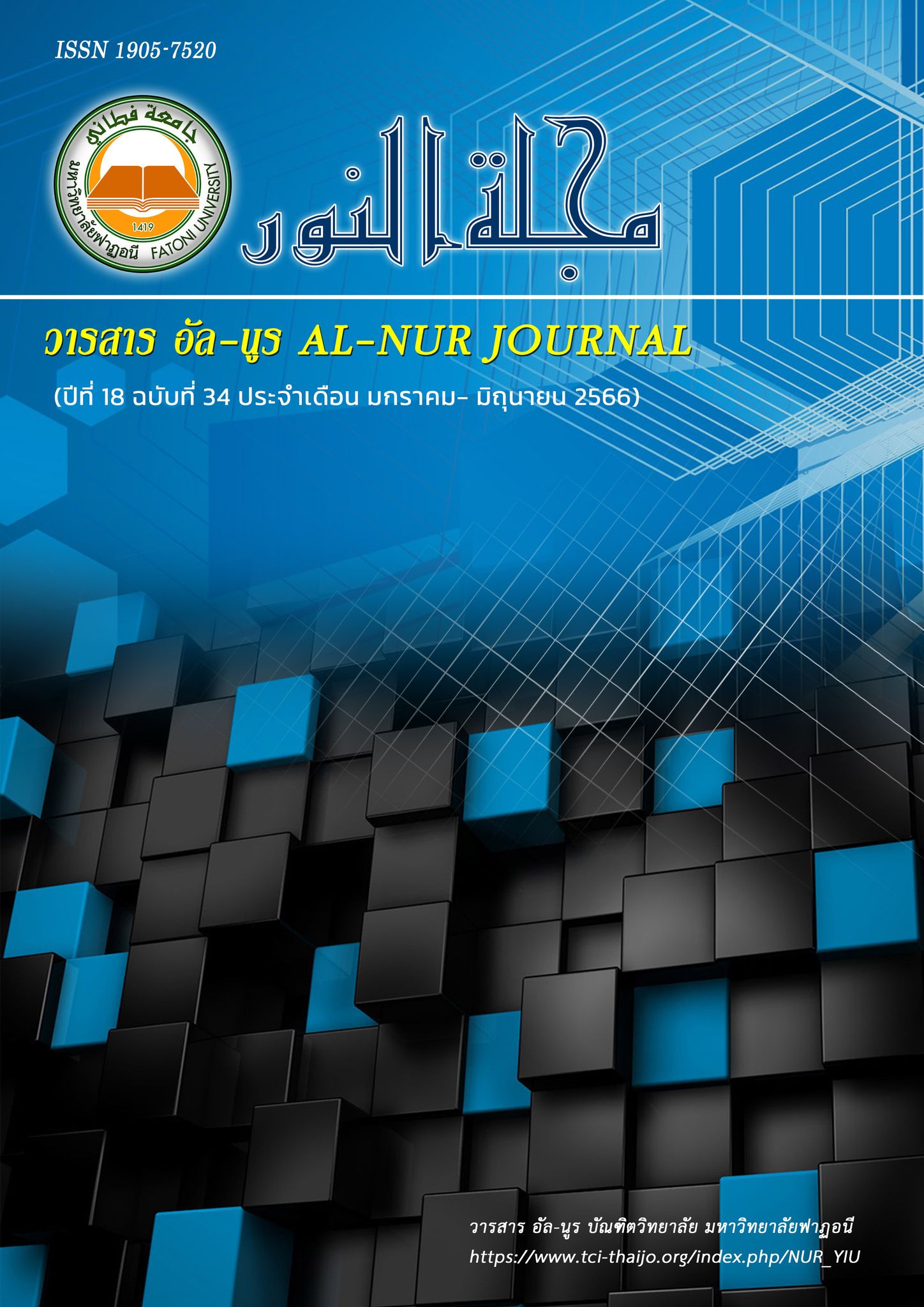การทำแท้งและกรอบความจำเป็นในมุมมองของนักปราชญ์อิสลาม
คำสำคัญ:
การทำแท้ง, กรอบความจำเป็น, มุมมอง, นักปราชญ์อิสลามบทคัดย่อ
บทคัดย่อ
งานวิจัยนี้เป็นการวิจัยเชิงคุณภาพ (Qualitative Research) มีวัตถุประสงค์เพื่อศึกษากรอบความจำเป็นและความเป็นไปได้ของการทำแท้งในมุมมองนักปราชญ์อิสลาม เป็นการวิจัยเอกสาร ศึกษาข้อมูลจากอัลกุรอาน อัสสุนนะฮ์ ตำรานิพนธ์สำนักอัลหะนะฟียะฮ์ อัลมาลิกียะฮ์ อัชชาฟิอียฺยะฮ์ อัลหะนาบิละฮ์และทัศนะของนักปราชญ์ร่วมสมัย ทำการวิเคราะห์สังเคราะห์ทัศนะและมุมมองตรวจสอบความถูกต้องของหลักฐาน แล้วสรุปเป็นของค้นพบของการวิจัย
ผลการวิจัยพบว่า การทำแท้งหลังเป่าวิญญาณเป็นที่ต้องห้ามหากปราศจากความขับคันจำเป็นที่ชอบด้วยบทศาสนบัญญัติถึงขั้นสูญเสียชีวิตของมารดาแล้วอนุโลมให้ทำแท้งเพื่อเป็นการรักษาชีวิตที่มีอยู่ หากไม่เช่นนั้นถือว่าเป็นความผิดอาญาฐานฆ่าผู้อื่นโดยเจตนาส่วนการทำแท้งก่อนเป่าวิญญาณ นักปราชญ์มีทัศนะแตกต่างกันสำนักอัลหะนะฟียะฮ์ มีความเห็นเป็นสองทัศนะ คือ 1. ห้าม และ2. อนุญาตเมื่ออายุครรภ์ยังไม่ถึงสี่เดือน สำนักอัลมาลิกียะฮ์ ห้ามในทุกขั้นตอน สำนักอัชชาฟิอียฺยะฮ์และอัลหะนาบีละฮ์ มีความเห็นเป็นสองทัศนะ คือ 1. อนุญาต อายุครรภ์ต้องไม่ถึงสี่สิบวัน และ 2. ห้ามเด็ดขาด การทำแท้งเพราะกลัวความอื้อฉาว มีสองทัศนะ คือ 1.ทำได้ ต้องก่อนเป่าวิญญาณ และ 2. ไม่อนุญาต ส่วนการทำแท้งทารกมีความผิดปกติ มีสองทัศนะ คือ 1. อนุญาตเมื่อพบความผิดปกติระยะแรกของอายุครรภ์ และ2. ไม่อนุญาต สรุปประเด็นทั้งสามกรณีข้างต้นไม่อนุญาตทำแท้งทารกหรือตัวอ่อนที่มีความสมบูรณ์หรือบกพร่อง หากขาดความจำเป็นหรือส่งผลอันตรายต่อชีวิตของหญิงผู้ตั้งครรภ์
เอกสารอ้างอิง
ระบบสถิติทางการทะเบียน. (2559). http://thaitgri.org/?p=36614g (เข้าถึงวันที่ 18 สิงหาคม,2563)
Praewpan Sirilurt. (2022). สธ. ประกาศ ‘ทำแท้งได้ ’ ไม่ผิดกฎหมาย แต่ต้องอยู่ในหลักเกณฑ์ อายุครรภ์ 12 – 20 สัปดาห์ เพื่อคุ้มครองสิทธิแม่และชีวิตของทารกในครรภ์ https://www.sdgmove.com/2022/10/03/abortion-law-unplanned-pregnancy/(เข้าถึงเมื่อวันที่ 6 ธันวาคม 2565)
Abi Dawood. (1988). Abi Dawood Sulaiman Ibn al- Asth Asth al- Sajistani al- Azadi, Sunan Abu Dawood, Dar al- Jill,
al- Boti. (1966). Muhammad Sa’ed al- Boti, Dhawabit al- Muslihah fi al- Sha’riah al- Islamiah, Matbah al- Ilmi, Demasq.
al- Boti. (1988). Muhammad Sa-ed Ramadhan al- Boti,masalah Tahdid al- Nasal Wiqayatan wa Ilajan, maktabah al- Farabi,Demasq.
al-Dasoqi. (n.d,). Shamsuddin Muhammad al- Dasuqi,Hashiyah al- Dasuqi fi al- Sharh al-Kabir lil al-Dardir, Matbaah Dar Ihyaa’ al- Kutub al- Arabiyah.
al-Ghazali. (1999). Hamid Muhammad bin Muhammad al-Ghazali, Ihyaa’ Ulumiddin, Matbaah Alam al- Kutub, Dimasq.
al- Murtadha. (1949). Ahmad bin Yahya al- Murtadha, al-Bahr al-Zukhar al-Jamia’ li Mazahib Ulamaa’ al- Amsar, Matbaah al- Sunnah al- Muhammadiah, Misr
al- Nabhani. (1953) Taqiyuddin al- Nabhani, al-Nidham al- Ijtima-ie fi al- Islam, Manshurat Hisbu al- Tahrir al- Qudus.
al-Nawawi. (n.d,). Sahih Al-Muslim bin al- Hajjaj al- Kushairi,Dar al- Kutub al- Ilmiah, Bairut.
al- Qaisi. (1997). Kamil Saqar al- Qaisi, Dhawabit Istikhdam al- Mawarid al- Bashariah fi al- Iqtisad al- Islami, Jamiah Baghdad, Iraq.
al-Ramli. (1967). Samashuddin Muhammad bin Abi al- Abbas Ahmad bin Hamzah bin Shihabuddin al-Ramli, Nihayah al-Muhtaj Sharh al- Minhaj, Matbaah Mustafa al-Babi al- Hambali wa Awladuhu, Misr.
al-Sayuti. (1982). Jalaluddin al-Sayuti, al-Ashbah wa al- Nadha-ir, Dar al-Kutub al- Ilmiah,Bairut.
Hashem Jamil. (1989). Ziraah al- Ajinnah fi Daw-ie al- Shariah al- Islamiah, Bahth Manshur fi Majallqah Resalah Islamiah, v.222 Rabi’ al-Awwal 1410 AH, Wazarah al- Auwqaf , Iraq.
Ibn Abidin. (2003). Rad al- Mukhtaj ala al- Addar al- Mukhtar Hashiyah Ibn Abidin, Dar Alam al- Kutub, al- Riyhad.
Ibn Hazmi. (2003). Abu Muhammad Ali bin Ahmad bin Sa-ed bin Hazmi al- Andalusi, al- Mahalla bi al- Athar, Dar Lotal- Kutub al- Ilmiah, Bairu
Ibn Humam. (1970). Muhammad bin Abdul wahid bin Abdulrahamid bin Masud, Fathul Qadir, Matbaah al-Kubra al- Amiriah, Misr.
Ibn Juza. ( 1977). Ibn al-Qasim Muhammad bin Ahmad Ibn Juza, al- Kalbi al- Gharnati,al- Qawanin al- Fighiah, Dar al- Qalam, Bairut.
Ibn Qudamah. (1998). Muwafiqqudeen Abi Muhammad bin Ahmad bin Muhammad bin Qudamah, al-Mughni, Dar Alam ak- Kutub, ar-riyhad.
Nizham. (n.d,). Nizham wa Jamaah lk Ulamaa’ al- Hind al- A’lamm,al- Fatawa al- Hindiah, Dar al-Ma’rifah, Bairut,
Shalatut. (n.d,). Imam al- Akbar Muhammad Shalatut, al- Islam Aqidatan wa Shariatan,t3, Dar al- Qalam, al- Qahirah.
Shalatut. (n.d.). Mahmood Shalatut, al-Fatawa li Imam al- Akbar, Muassasah Dar al- Sha’ab,
Shar fuddin. (1380). Shar fuddin Musa bin Ahmad, al-Rawd al- Murbia’ bi Sharh al- Mustaqnia’ Matbaah al- Salafiah, al- Qahirah.
Wasfi Muhammad Ali. (1998). al- Tib al-Adli Ilman wa Tatbeeqan, Matbah Maafirf, Baghdad.
ดาวน์โหลด
เผยแพร่แล้ว
ฉบับ
ประเภทบทความ
สัญญาอนุญาต
ลิขสิทธิ์ (c) 2023 abdulroya benseng

อนุญาตภายใต้เงื่อนไข Creative Commons Attribution-NonCommercial-NoDerivatives 4.0 International License.
Proposed Creative Commons Copyright Notices


